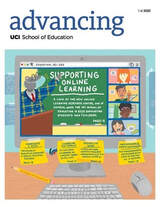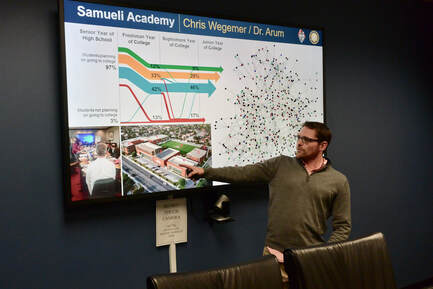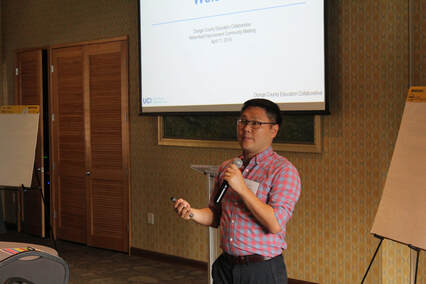Riding the Wave
The UCI School of Education’s Orange County Educational Advancement Network (OCEAN) began in fall 2018, establishing partnerships between the School of Education and K-12 schools. Now, the network is generating tangible improvements in schools across Orange County
If the inaugural 2018-19 year was a splash for the OCEAN network, then 2019-20 was a tidal wave of research, findings, and interventions at K-12 schools across Orange County.
OCEAN is a network of research-practice partnerships between the School of Education and K-12 schools in Orange County. At each site, a School of Education faculty member and doctoral student work with school leadership to identify the greatest needs and goals of the school, and in turn conduct research that will positively impact the school.
Ten school sites participated in OCEAN during the 2019-20 academic year, many for the second consecutive year. For first-year sites, the focus was on building relationships and identifying potential research topics. For second-year sites, however, research took off in new and creative directions leading to grant awards that will help increase the reach and impact of the network.
“The rhythm of these partnerships is starting to become clear, and it’s incredibly encouraging,” said June Ahn, director of OCEAN and associate professor at the School of Education. “It was very rewarding to see how investing in a relationship can pay off in providing service to the community, and we now have clear examples of how spending a year of dedicated time with a school site can accelerate research in year two.”
OCEAN is a network of research-practice partnerships between the School of Education and K-12 schools in Orange County. At each site, a School of Education faculty member and doctoral student work with school leadership to identify the greatest needs and goals of the school, and in turn conduct research that will positively impact the school.
Ten school sites participated in OCEAN during the 2019-20 academic year, many for the second consecutive year. For first-year sites, the focus was on building relationships and identifying potential research topics. For second-year sites, however, research took off in new and creative directions leading to grant awards that will help increase the reach and impact of the network.
“The rhythm of these partnerships is starting to become clear, and it’s incredibly encouraging,” said June Ahn, director of OCEAN and associate professor at the School of Education. “It was very rewarding to see how investing in a relationship can pay off in providing service to the community, and we now have clear examples of how spending a year of dedicated time with a school site can accelerate research in year two.”
UNCHARTED WATERS
|
Novel research is being conducted across Orange County – from Santa Ana to San Juan Capistrano, Costa Mesa to Orange – to improve a variety of needs.
For example, at High School Inc. Academies Foundation and Valley High School, doctoral students Phebe Chew and Grace Kim, along with Ahn, are conducting research to better understand the variation in career-technical education experiences – i.e., how do career-technical experiences improve students’ college and career readiness, and what specific mechanisms lead to positive outcomes. The group is also working to set up a data infrastructure that analyzes and tracks school alumni through college and beyond. Based on the data, the partnership will conduct in-depth analysis of the school’s internship program – interviewing mentors, internship coordinators, and alumni – to improve the school’s internship program to best support college and career readiness. |
“It has been a pleasure to work with the UCI School of Education and the OCEAN program to implement our first-ever longitudinal study,” said Mary Tran, executive director of High School Inc. Academies Foundation.
Tran said that one of the many findings from the study was that students who had a business mentor and/or participated in the school’s core workforce development initiatives found the High School Inc. Academies program to be more helpful in assisting them in achieving their career and college goals than students who did not have those same experiences.
“With these findings, we are in the process of developing a plan to expand these core college and career experiences so that more students can participate and benefit,” Tran said. “I’m confident the data will bring more meaning to the High School Inc. college and career academies model and will be crucial in the creation of the HSI Foundation’s strategic plan.”
At TLC Charter School in Orange – a full-inclusion school founded in 2018 in which students of diverse abilities, cultures, languages, and lived experiences learn together in the same classroom – doctoral candidate Yenda Prado and Professor Mark Warschauer are researching how the full inclusion model functions at the intersection of language, literacy, and technology.
“Inclusive models of education are under-researched areas of study,” Prado said. “There isn’t much literature on best practices for implementing a full-inclusion model or what that means for student learning, family support, or staff professional development.”
The team is also researching how to integrate technology into classrooms serving students with diverse abilities and learning support needs, and is working with TLC’s Founding Principal and Executive Director Dr. Jessica Tunney (Ph.D. ’16) to publish a series of blog posts that outline best practices and resources for elementary school distance learning in response to COVID-19.
Tran said that one of the many findings from the study was that students who had a business mentor and/or participated in the school’s core workforce development initiatives found the High School Inc. Academies program to be more helpful in assisting them in achieving their career and college goals than students who did not have those same experiences.
“With these findings, we are in the process of developing a plan to expand these core college and career experiences so that more students can participate and benefit,” Tran said. “I’m confident the data will bring more meaning to the High School Inc. college and career academies model and will be crucial in the creation of the HSI Foundation’s strategic plan.”
At TLC Charter School in Orange – a full-inclusion school founded in 2018 in which students of diverse abilities, cultures, languages, and lived experiences learn together in the same classroom – doctoral candidate Yenda Prado and Professor Mark Warschauer are researching how the full inclusion model functions at the intersection of language, literacy, and technology.
“Inclusive models of education are under-researched areas of study,” Prado said. “There isn’t much literature on best practices for implementing a full-inclusion model or what that means for student learning, family support, or staff professional development.”
The team is also researching how to integrate technology into classrooms serving students with diverse abilities and learning support needs, and is working with TLC’s Founding Principal and Executive Director Dr. Jessica Tunney (Ph.D. ’16) to publish a series of blog posts that outline best practices and resources for elementary school distance learning in response to COVID-19.
|
“The OCEAN partnership keeps TLC connected to research on teaching and learning as we explore essential questions about schooling, education, and equity in practice,” Tunney said. “We have been able to collaborate with university researchers and scholars as we design school-based learning opportunities that respectfully engage all learners at our school, develop innovations in inclusive education, and cultivate a collaborative, caring, and supportive environment for our diverse community of students, staff, and families.”
At Katella High School in Anaheim, doctoral student Lora Cawelti and Associate Professor Penelope Collins are studying how instituting intentional practices encourages growth in the 5 C’s (Creativity, Critical Thinking, Collaboration, Communication, Compassion and Character) and promotes student voice to build a positive school climate in a California Democracy High School. Through a mixed-methods approach that engaged students, teachers, and staff, the research team explored best practices and areas for growth in student-centered curriculum, civic engagement, student safety and well-being, and peer leadership. |
Doctoral candidate Jiwon Lee and Professor Rossella Santagata are partnering with Rea Elementary, part of the Newport-Mesa Unified School District, and the Orange County Department of Education on a project known as School-Wide Improvement in Mathematics (SWIM). Lee and Santagata serve on the project’s leadership team, and assist in the planning and support of mathematics professional development activities for teachers. The duo conducted teacher surveys and interviews and analyzed more than 150 K-2 students’ work samples. Findings were used to inform future professional development.
“Our observations, surveys, and interviews showed that teachers changed their mathematics teaching practices by placing the child’s thinking and reasoning at the center of instruction,” Santagata said. “Teachers also appreciate the school’s new focus on collaboration and refer to opportunities to co-plan and analyze student work together as fundamental to the improvement of their teaching.”
Dr. Duane Cox, principal of Rea Elementary School, appreciates the time investment from Lee and Santagata.
“For them to attend our meetings and sit down with groups of teachers and learn along with them is incredibly powerful,” Cox said. “We talk about professional development, systems, processes, data, and books. Their presence has helped build my capacity, and it’s made me realize that I want my teachers to have this opportunity – to have these professional dialogues about articles and research.”
“Our observations, surveys, and interviews showed that teachers changed their mathematics teaching practices by placing the child’s thinking and reasoning at the center of instruction,” Santagata said. “Teachers also appreciate the school’s new focus on collaboration and refer to opportunities to co-plan and analyze student work together as fundamental to the improvement of their teaching.”
Dr. Duane Cox, principal of Rea Elementary School, appreciates the time investment from Lee and Santagata.
“For them to attend our meetings and sit down with groups of teachers and learn along with them is incredibly powerful,” Cox said. “We talk about professional development, systems, processes, data, and books. Their presence has helped build my capacity, and it’s made me realize that I want my teachers to have this opportunity – to have these professional dialogues about articles and research.”
RESPONSE TO COVID-19
|
One of the main goals of OCEAN is to not only conduct research vis-à-vis the individual partnerships, but to then bring together the participating K-12 school sites to address common issues and goals, and serve the Orange County community. The seismic shift to remote instruction provided an opportunity for such collaboration.
This summer, graduate students in OCEAN conducted more than 30 interviews with administrators, teachers, staff, and parents to hear the unspoken stories of the COVID-19 pandemic, and how schools are dealing with the adversity. Common themes included proper ways to train staff to ensure quality remote learning, concerns over physical and mental well-being, ways to safely re-open schools, and worries for students and families facing financial difficulties and shifting roles and responsibilities. “The pandemic forced us to be closer in our partnerships, and I think the value of having a network such as OCEAN becomes clearer,” Ahn said. “It was not and is not business as usual – schools need partners to think and work with.” |
In June, UCI’s Office of Inclusive Excellence awarded Ahn – along with Professor Rossella Santagata and Assistant Professor Adriana Villavicencio – a grant to document and synthesize the ways in which communities are supporting students, and provide support in areas of need through a Networked Improvement Community composed of School of Education researchers, school leaders, district leaders, and community members.
In kind, OCEAN established four working groups, focused on promoting mental health and well-being for students, working with teachers to improve pedagogy and learning, supporting Orange County principals and K-12 leadership, and supporting family learning pods.
With the support, Ahn and the family learning pods group are matching UCI undergraduates with families in need of tutoring services for K-12 students. K-12 schools in the OCEAN network are helping identify families in need, while the School of Education – and UCI CalTeach program – are training volunteer students to serve as tutors.
“We found, through our interviews, that many parents and schools are searching for ways to provide personal attention to K-12 students as they attend virtual or hybrid schooling,” Ahn said. “We believe that equitable and community-driven approaches are vital to help each other in this critical moment – we are going to use OCEAN to model how a university can help facilitate this type of help for communities and families in need.”
In kind, OCEAN established four working groups, focused on promoting mental health and well-being for students, working with teachers to improve pedagogy and learning, supporting Orange County principals and K-12 leadership, and supporting family learning pods.
With the support, Ahn and the family learning pods group are matching UCI undergraduates with families in need of tutoring services for K-12 students. K-12 schools in the OCEAN network are helping identify families in need, while the School of Education – and UCI CalTeach program – are training volunteer students to serve as tutors.
“We found, through our interviews, that many parents and schools are searching for ways to provide personal attention to K-12 students as they attend virtual or hybrid schooling,” Ahn said. “We believe that equitable and community-driven approaches are vital to help each other in this critical moment – we are going to use OCEAN to model how a university can help facilitate this type of help for communities and families in need.”
YEAR 3 - HIGH TIDE
OCEAN enters its third year with tremendous momentum. Over the summer, OCEAN faculty received grants from the Gates Foundation, National Science Foundation, NewSchools Venture Fund, and Spencer Foundation to support various aspects of OCEAN work. This includes a partnership, led by Assistant Professor Andres Bustamante and Ahn, with the city of Santa Ana, to design learning opportunities into everyday city spaces such as bus stops, grocery stores, and playgrounds.
In total, OCEAN will receive more than $3 million in grant funding in the coming year, which Ahn attributes to the two years of groundwork laid by OCEAN partnership work and philanthropic support from early private donors. Not stopping there, Ahn hopes to ride the wave of momentum off this past summer’s working groups and grant awards.
“In the third year, my instinct is that we can accelerate cross-school collaboration and bigger research projects,” he said. “The working groups we conducted this past summer could serve as a model of how to do this research, and I expect that by summer 2021, we will have pockets of schools doing cross-research in a similar fashion.”
In total, OCEAN will receive more than $3 million in grant funding in the coming year, which Ahn attributes to the two years of groundwork laid by OCEAN partnership work and philanthropic support from early private donors. Not stopping there, Ahn hopes to ride the wave of momentum off this past summer’s working groups and grant awards.
“In the third year, my instinct is that we can accelerate cross-school collaboration and bigger research projects,” he said. “The working groups we conducted this past summer could serve as a model of how to do this research, and I expect that by summer 2021, we will have pockets of schools doing cross-research in a similar fashion.”





